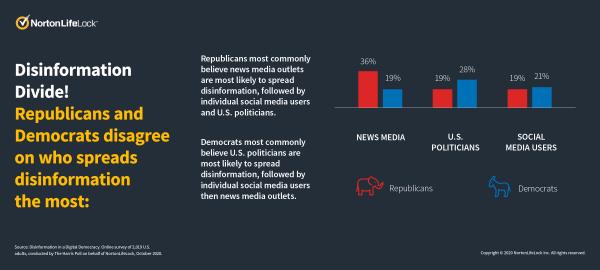“Social media has created ideological echo-chambers that make people more susceptible to disinformation,” said Daniel Kats, a senior principal researcher at NortonLifeLock Labs. “Disinformation campaigns can spread like wildfire on social media and have a long-lasting impact, as people’s opinions and actions may be influenced by the false or misleading information being circulated.”
NortonLifeLock identifies and reports bots that may be nefariously sharing disinformation on social media to help stop it from spreading, and offers a free tool for consumers called BotSight. Botsight shows if a Twitter account is likely a bot to help people make informed decisions about where they are getting their information. However, no matter who or what posts the information, fact-checking is a best practice for consumers to help stop the spread of disinformation. According to our online survey of more than 2,000 US adults, conducted by The Harris Poll, about half of Americans (53%) often question whether information they see on social media is disinformation or fact.
The majority of Americans agree that disinformation has the ability to greatly influence someone’s opinion (86%), but far less (58%) acknowledge that disinformation could influence them. Although 8 in 10 Americans (82%) are very concerned about the spread of disinformation, 1 in 5 (21%) still say social media companies do not have the right to remove it from their platform, with Republicans being almost twice as likely as Democrats to feel this way (25% vs. 13%).
“From disinformation campaigns to deepfakes, it’s becoming increasingly difficult for people to tell real from fake online,” added Kats. “It’s important to maintain a healthy dose of skepticism and to fact check multiple sources – especially before sharing something – to help avoid spreading disinformation.”
Additional findings from the NortonLifeLock Disinformation in a Digital Democracy Study include:
- More than a third of Americans don’t know the true purpose of disinformation. Only 62% of Americans know that disinformation is created to cause a divide or rift between people; 72% of both Republicans and Democrats believe disinformation is created for political gain.
- 79% of Americans believe social media companies have an obligation to remove disinformation from their platforms, with the majority of Democrats (87%), Republicans (75%) and Independents (75%) supporting this.
- Democrats and Republicans disagree on who spreads disinformation the most, with Republicans most commonly stating news media outlets are most likely to spread disinformation (36%), and Democrats stating it’s U.S. politicians (28%).
- Disinformation has taken a toll on relationships, with many Americans having argued with someone (36%), unfriended/unfollowed someone on social media (30%), or taken a break from social media altogether (28%) because of disinformation.
For more information and tips, please visit norton.com/internetsecurity and join the conversation on Facebook, Instagram, Twitter and LinkedIn.
About the NortonLifeLock Disinformation in a Digital Democracy Study
This survey was conducted online within the United States by The Harris Poll on behalf of NortonLifeLock from October 13-15, 2020 among 2,019 U.S. adults ages 18 and older. Figures for age, sex, race/ethnicity, education, region, employment, marital status, household size and household income were weighted where necessary to bring them into line with their actual proportions in the population. Propensity score weighting was used to adjust for respondents’ propensity to be online./
About NortonLifeLock Inc.
NortonLifeLock Inc. (NASDAQ: NLOK) is a global leader in consumer Cyber Safety. NortonLifeLock is dedicated to helping secure the devices, identities, online privacy, and home and family needs of approximately 50 million consumers, providing them with a trusted ally in a complex digital world. For more information, please visit www.nortonlifelock.com.


